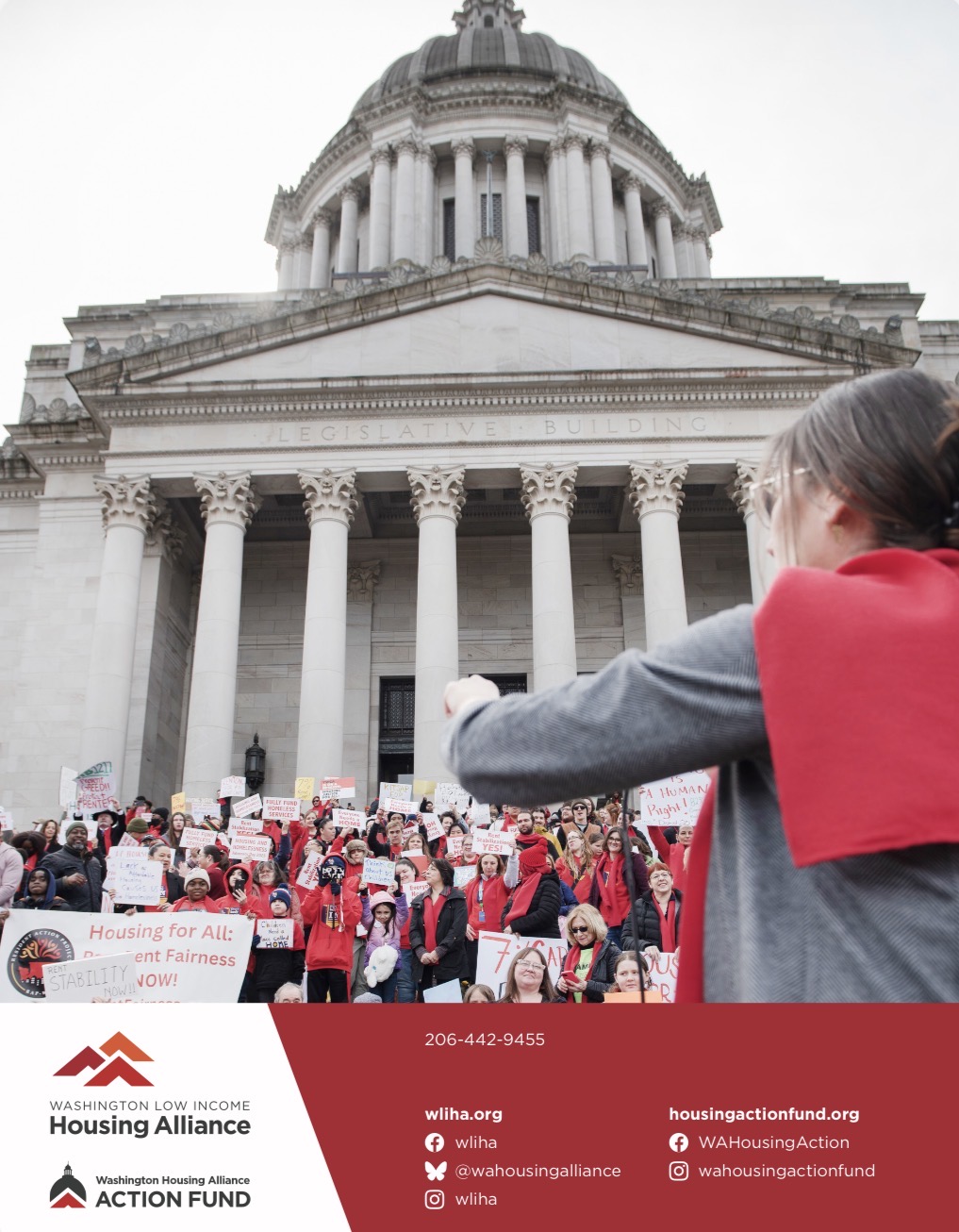Read the 2025 Report in PDF format here.
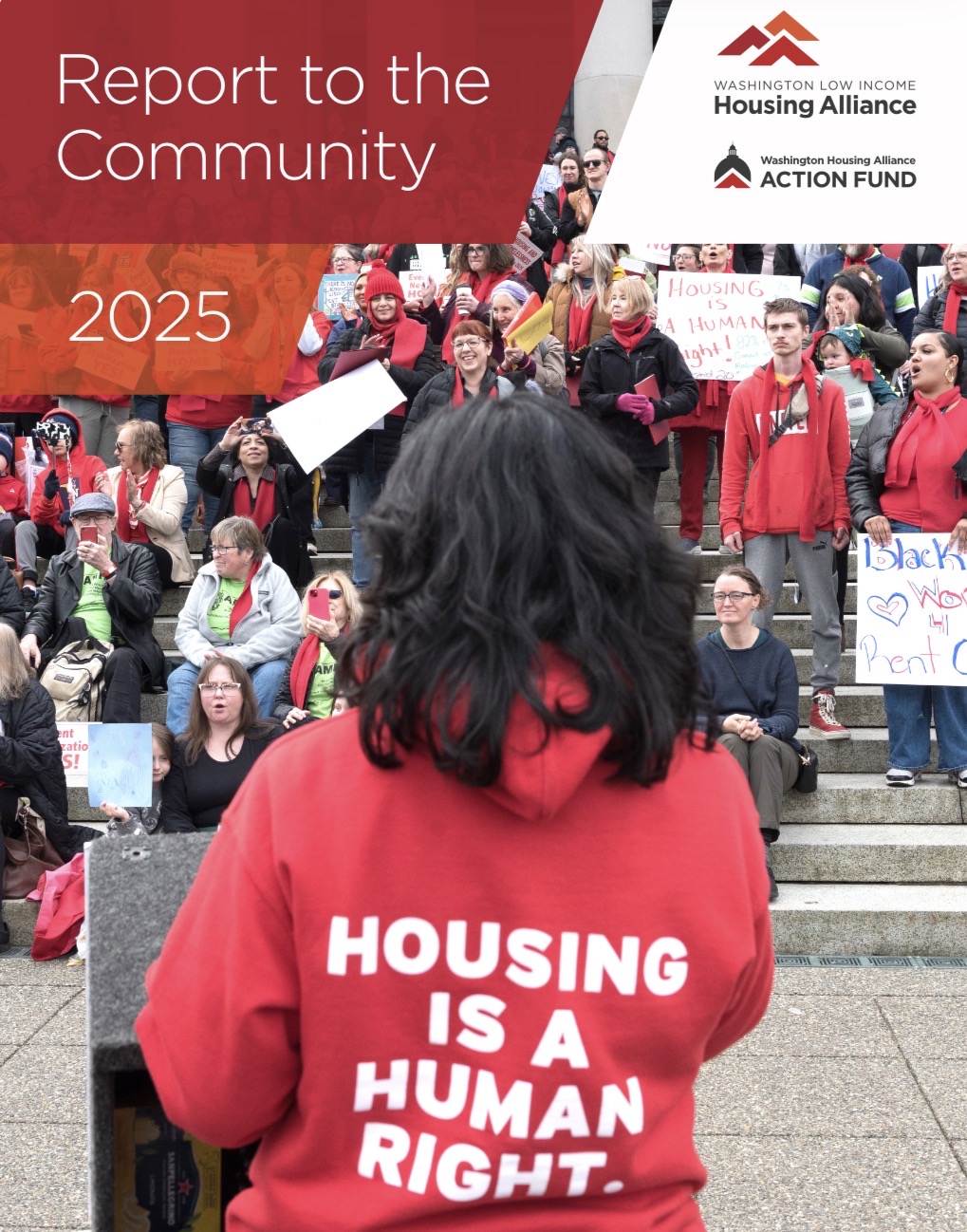

I’m proud to share our 2025 Report to the Community with you!
It reflects another year of bold, strategic advocacy, and real progress in the fight for housing justice in Washington.
We’re living through a time of deep uncertainty. At the federal level, critical safety net programs face devastating cuts. Efforts to reckon with and undo the harm of structural racism are under attack. And we’re witnessing a rise in authoritarian rhetoric and policy threatening our very democracy. Here in Washington, a significant budget shortfall threatened to derail urgently needed investments in housing and homelessness services.
And yet—even in the face of these challenges—our movement showed what’s possible when we come together and refuse to back down. We made real progress in this year’s legislative session. We changed policies that will impact people’s lives immediately, and we grew our movement, setting the stage for even bigger victories in the future.
In 2025, Washington became the third state in the country to limit how much landlords can raise the rent each year, protecting tenants from rent gouging when landlords raise the rent as high as they want, just because they can! We also secured one of the largest-ever state investments in affordable housing, protected homelessness services that were at risk of significant cuts, and increased the state investment in legal support for tenants facing eviction. These investments will ensure more people across Washington can access, and keep, safe, stable homes they can afford.
These victories didn’t happen by chance. They were the result of tireless advocacy, strategic partnerships, and a growing movement that refuses to give up. They were possible because thousands of people took action and because people most impacted by the housing crisis bravely shared their personal stories with lawmakers, shifting hearts and policy.
This report reflects more than legislative wins. It also highlights how we’re continuing to build the long-term movement for housing justice, organizing across the state, growing community leadership, advancing equity and racial justice, and building the public and political will to make housing a human right.
This movement is powered by people like you: advocates, donors, organizers, storytellers, and voters. We know what it takes to solve the affordable housing and homelessness crisis, and together, we’ll keep fighting for the future we all deserve.
Sincerely,
Rachael Myers
Executive Director
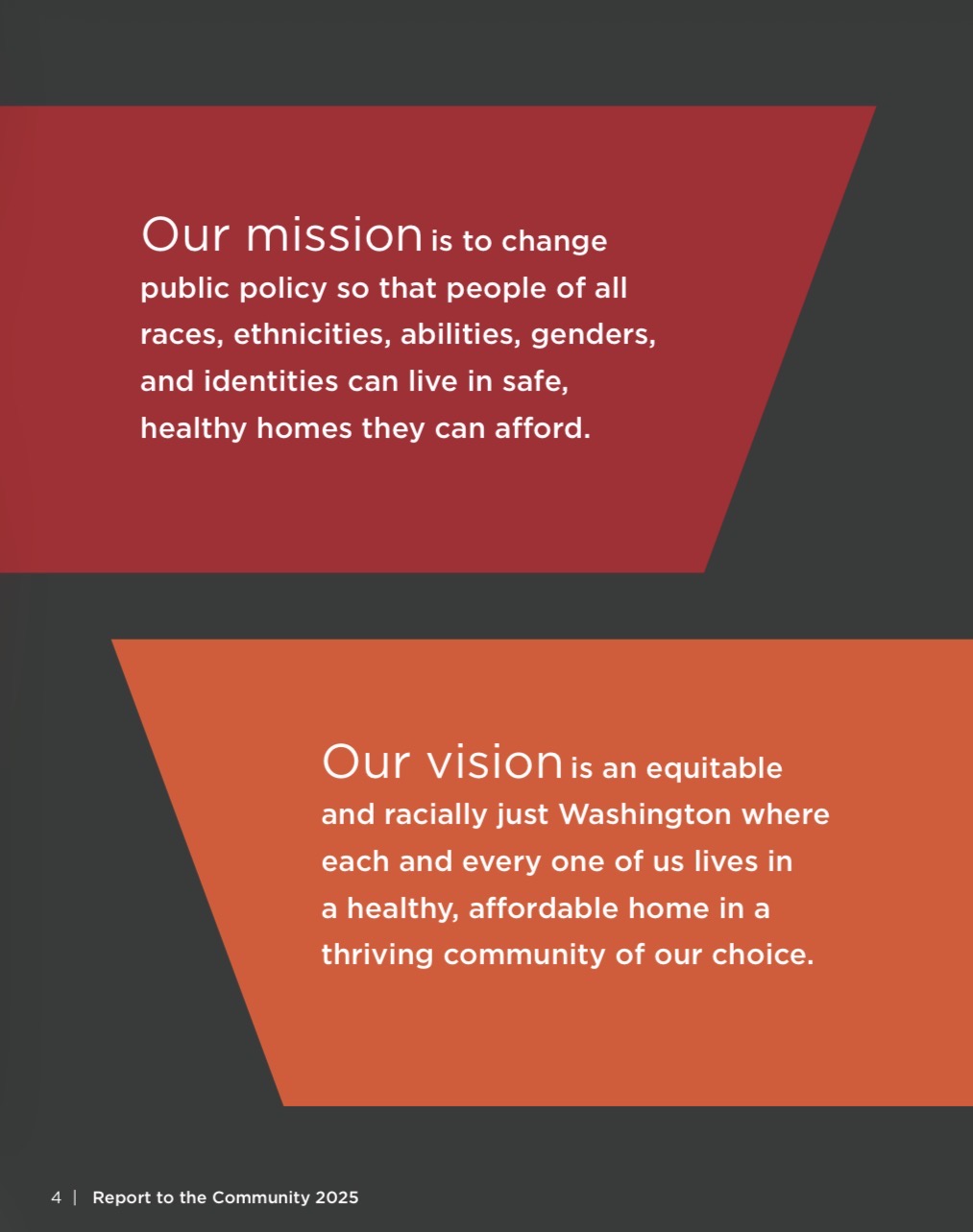
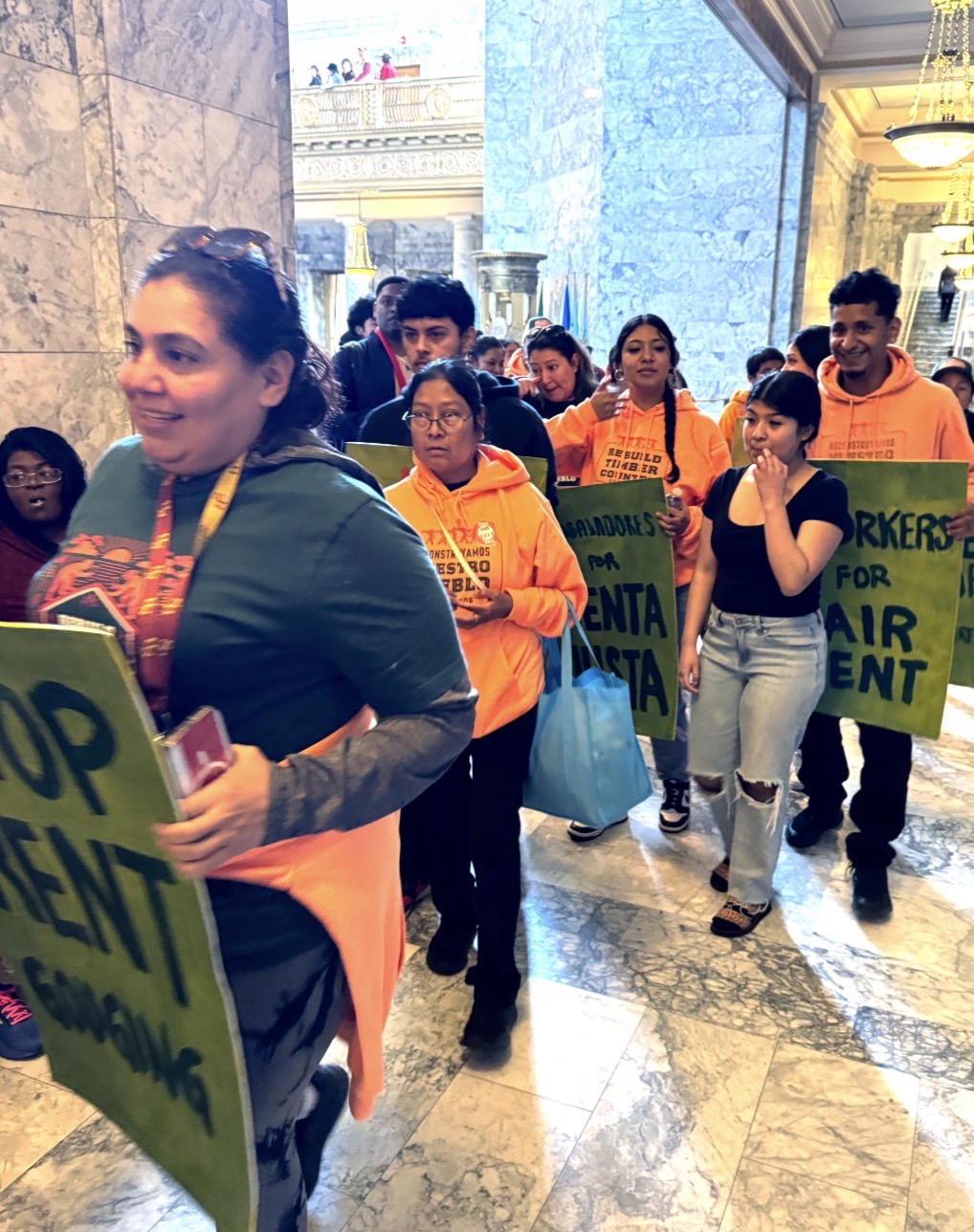
State of Housing and Homelessness in Washington
WASHINGTON IS LEADING THE WAY IN ADDRESSING THE AFFORDABLE HOUSING AND HOMELESSNESS CRISIS!
The state has invested record amounts in homelessness services and affordable homes, adopted strong eviction prevention policies and made rent gouging illegal, expanded funding for rental assistance and much more. But those investments and policies haven’t kept pace with rising housing costs. In Washington, a safe, stable home is still out of reach for many.
• In the next 20 years Washington needs over million more homes. Almost 650,000 will need to be affordable for low-income households.
• Almost 240,000 renter households in Washington are considered extremely low-income, earning less than 30% of the median income in the area where they live. But there are just three affordable and available rental homes for every ten households at this income level.
• Washington has the sixth-highest housing wage in the nation. Affording a modest two-bedroom apartment requires a full time wage of $41.11 per hour. In King and Snohomish counties, that jumps to more than $51 per hour. Because of these high rents, more than three quarters of the lowest income households pay more than half of their income for rent, leaving very little left over for food, transportation, childcare, and other basic needs.
• In 2024, there were more than 23,000 evictions filed in Washington — the highest number in our state’s recorded history — largely due to tenants being unable to keep up with high rents and other expenses. That’s up from 10,425 in 2022 and 16,545 in 2023.

• The point in time count in January 2025 identified 22,173 people experiencing homelessness including over 7,267 people living without any shelter. King County did not conduct an unsheltered count in 2025. Excluding King County’s unsheltered count, that represents an 8.7% increase since 2023.
The Point in Time Count shows trends but is influenced by factors like weather and volunteer availability. Commerce’s Snapshot report combines data from state agencies to provide the most comprehensive estimate of homelessness. The 2025 Snapshot report identified 158,791 people in emergency shelters or unhoused in January 2025.
• Racial disparities exist in every housing indicator, especially for Black and Indigenous people. People of color are more likely to experience homelessness, more like to face evictions, more likely to pay more than they can afford for rent, and are less likely to own their homes and benefit from the generational wealth that is often part of home ownership.
AS THE AFFORDABLE HOUSING AND HOMELESSNESS CRISIS GROWS, THE COMMUNITY-BASED ORGANIZATIONS DEDICATED TO HELPING PEOPLE ARE ALSO STRUGGLING.
• Homelessness service workers, especially those on the front lines, are frequently underpaid for jobs that require facing trauma and suffering every day. Homelessness organizations are struggling to hire and keep frontline staff — the very people we’re relying on to address the homelessness crisis.
• Many nonprofit and public housing providers are facing significant budget challenges stemming from skyrocketing insurance and other costs and the end of pandemic era rent assistance.
• Affordable housing and homelessness services providers are bracing for a federal budget that could include devastating cuts.

BANNING RENT GOUGING AND MUCH MORE!
House Bill 1217, passed the legislature on the last day of the session and took effect on May 7! The bill caps annual rent increases to the lower of 7% plus inflation or 10% for most residential tenants. For manufactured homeowners renting the land where their home sits, rents increases are limited to no more than 5%.
Rent stabilization passed despite a fierce and expensive opposition campaign led by the real estate industry and their lobbyists. While it wasn’t the cap we wanted, this bill prevents the most egregious rent gouging and protects tenants from the 20%, 30%, and even higher rent increases that had become all too common. Thousands of advocates, including impacted renters, spoke up in support of this commonsense bill, along with legislative champions including Senators Emily Alvarado and Yasmin Trudeau and Representatives Nicole Macri and Strom Peterson. Our collective advocacy made us just the third state in the nation to limit rent increases statewide and gave us momentum on which to build for even better tenant protections in the future!
House Bill 1858, sponsored by Rep. Shaun Scott eliminated an exemption that previously allowed financial institutions that buy and sell mortgages to avoid paying the document recording fee. This change will generate an additional $78 million every two years for homelessness services and the Covenant Homeownership Program.
House Bill 1491, sponsored by Rep. Julia Reed increases density near transit on schedule with comprehensive plan updates. To take advantage of the increased density, new housing developments must include some units that are affordable to low-income households.
The Housing Alliance supported many other bills. See more details about outcomes from the 2025 session at wliha.org/2025-public-policy-priorities/2025-priority-bill-tracker.
INVESTMENTS IN AFFORDABLE HOUSING AND HOMELESSNESS SERVICES
The capital budget included a record $605 million to build and preserve affordable homes through the Housing Trust Fund and an additional $9 million for youth and young adult shelter and housing programs.
The operating budget included over $229 million to fully replace the shortfall in document recording fee revenue that funds homelessness services including rental assistance, emergency shelters, and other programs critical to preventing homelessness. That includes a 5% inflationary adjustment to help service providers keep up with rising costs. This represents an extraordinary investment in a year with such a massive state budget deficit!
The operating budget also included enough funding for the Right to Counsel program to provide lawyers for low-income tenants facing eviction in the 2026 fiscal year. Approximately $3 million more will be needed in next year’s supplemental budget to meet the need for the next fiscal year.
The budget included other important investments including maintaining last year’s increase to the Housing and Essential Needs rental assistance program, Operations, Maintenance and Services funding for permanent supportive housing and other affordable housing, funding to resolve encampments by providing shelter, housing, and services for people living unsheltered, and more.
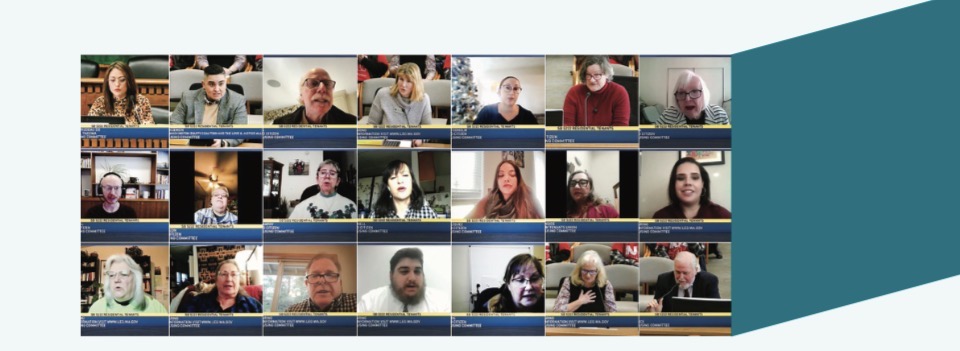
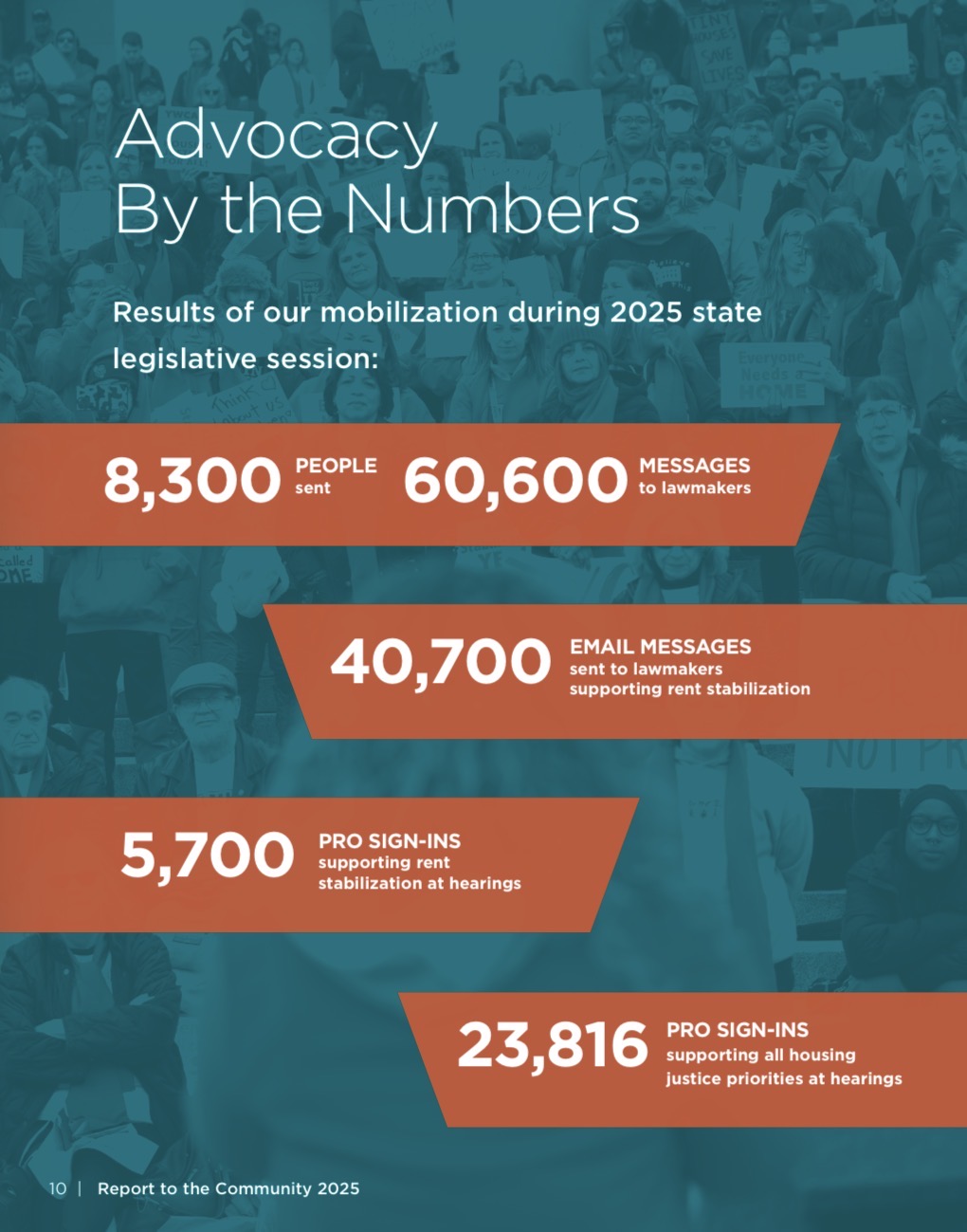

THE TESTIMONY AND STORIES FROM RENTERS AND MANUFACTURED HOMEOWNERS FROM ACROSS THE STATE GUIDED THE EFFORT TO PASS HB 1217 TO END RENT GOUGING, CAPPING A MULTI-YEAR EFFORT THAT INVOLVED THOUSANDS OF PEOPLE!
The journey to pass legislation to end rent gouging was long and full of twists and turns, and when the final bill passed on the last day of the 2025 session, it included strong protections for manufactured homeowners with annual rent caps of no more than 5%, and limited annual rent increases for residential tenants to 7% plus the Consumer Price Index, with a cap of no more than 10%. The new limits on annual rent increases were won thanks to the dedication of core advocates and thousands of new supporters. Over the past three years, they sent messages, signed petitions, and shared personal stories about rent hikes and the urgent need for relief.
Dozens of allied organizations from across the state also helped win this progress by mobilizing their members to call and write their lawmakers and to sign in and testify at hearings. Over 5,700 people signed in to support this bill at committee hearings, far outnumbering the opposition every time!
We honored some of the advocates and lawmakers who led the way during our Post-Legislative Session Celebration hosted live in Seattle and Spokane, as well as online, in June.
We awarded our annual Nancy Amidei Movement Builder Award to two incredible advocates, Tina Hammond and Duana Rick’s-Johnson. Nancy was true movement builder, who spent her career helping others learn how to use their voice for social change. This year’s award was bittersweet as Nancy passed away in April.
We recognized Tina Hammond from Spokane for her advocacy, including sharing her story of how repeated rent increases in her manufactured housing community forced her to ration medications and to turn her heat off at night during the winter months to be able to keep up with her rent increases.
We recognized Duana Ricks-Johnson from Vancouver for her relentless advocacy over the last year, sharing how rent increases and discrimination forced her family to move five times in four years. Duana shared her personal story in direct testimony in legislative hearings, by writing letters and op-eds in local newspapers, and by encouraging others in her community to stand up for housing justice. To learn more about the Nancy Amidei Movement Builder Award, visit our website at wliha.org/NancyAmideiMovementBuilder.
We recognized four incredible partner organizations for their leadership. Futurewise and Bryce Yadon were honored for their lobbying efforts throughout the 2025 session in support of rent stabilization, including work to combat false narratives and to push back on the use of industry-funded reports in the arguments made by corporate landlords.
The Latino Community Fund of Washington state leader Jake Garcia was honored for jumping in at every opportunity to help move lawmakers to pass HB 1217. Jake also provided powerful testimony to support rent stabilization during committee hearings throughout the legislative session.
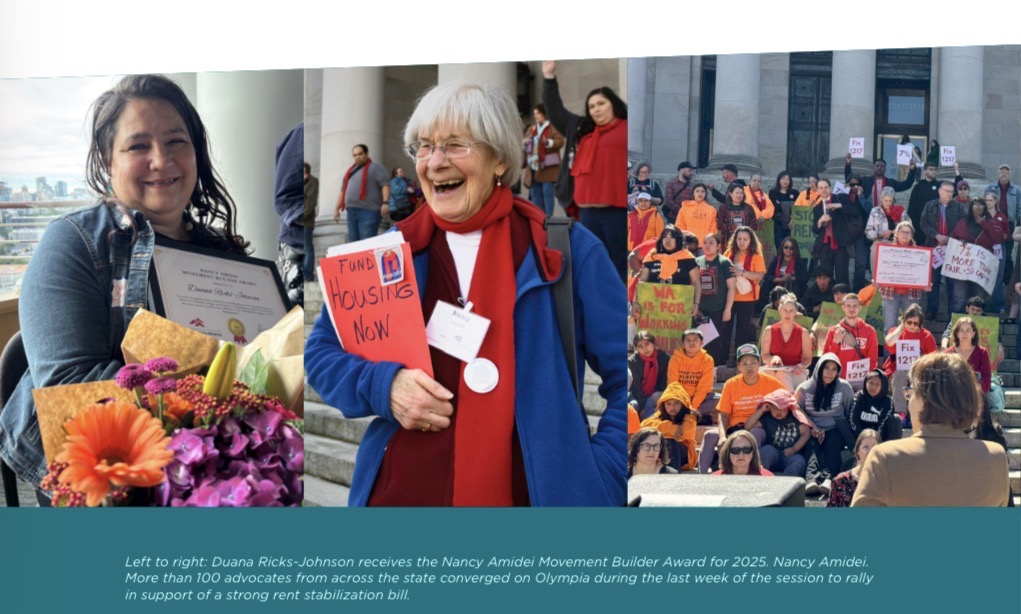
UFCW 3000 was honored for their organizing work, including holding “power hours” on rent stabilization and bringing people to the capitol campus during HHAD and the emergency rally we organized near the end of the session, when advocates demanded that lawmakers strengthen HB 1217.
AMHO — the Association of Manufactured Homeowners — was honored for the efforts they made over the last three years to organize manufactured homeowners from across the state to bring their stories to Olympia, both in person and through online testimony.
We also presented Housing Champion Awards to lawmakers who played key roles in the passage of HB 1217 and other housing justice priorities in 2025. These include:
Sen. Emily Alvarado
Rep. Nicole Macri
Sen. Yasmin Trudeau
Rep. Strom Peterson
Sen. Jessica Bateman
Rep. Natasha Hill
Sen. T’wana Nobles
Rep. Alex Ramel
Rep. Darya Farivar
Sen. Nicole Frame
Rep. Shaun Scott
Rep. Julia Reed
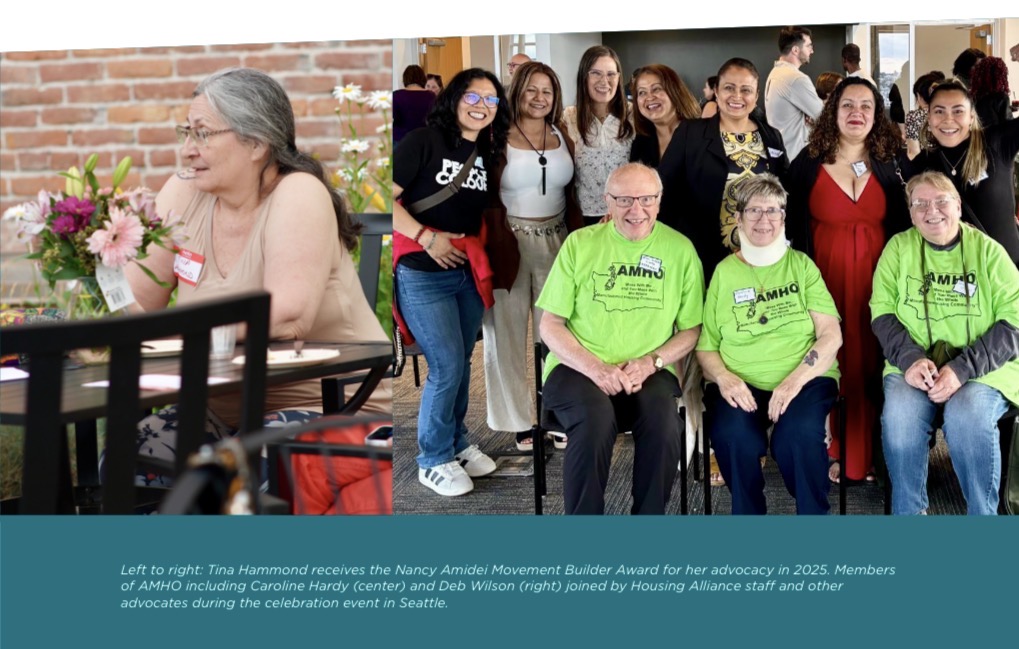

ACTIONSHOPS: MEMBER AND COMMUNITY TRAININGS
This year, our “Lunch & Learn: Equity, Racial Justice & Culture” Actionshop Series has been intentionally curated to meet this moment in our political history. So far, we have offered trainings on how to support our transgender community, understanding the DEI backlash and impacts to our partner organizations, how to have Kitchen Conversations to stand firm on our racial equity values, recognizing the intersections of disability and racial justice, and enjoyed a multi-day beginner series to grasp equity concepts and practicing liberation internally and with your organization.
In 2024 our series covered a wide range of important topics including the roots of inequitable housing policies, implicit bias, colorism, implementing equitable boards for people with lived expertise, uncovering and combating white supremacy culture, and practices to dismantle our internalized messages of racial inferiority and superiority.
In early 2025 we learned how to create neurodivergent-friendly workspaces and talk seriously about strategies for digital safety. Our fall lineup will focus on our country and state’s history of harmful housing and economic policy, particularly against racialized communities and how those policies remain, on paper and in culture. Go to our website to register.
The purpose of these actionshops is to connect our work of housing justice as non- profit organizations to the practices of using equity frameworks, anti-racism, and culture change. They are called “actionshops” as coined by one of our speakers, Sidney Morgan, because participating in a webinar is just the beginning. Authentic change takes intentional action until it becomes second nature. Externally, these practices are meant to inform state policy, program implementation, and equitable distribution of housing resources. Internally, these practices are intended to inform non-profit operations and how we support and care for one another in affinity, in solidarity, and as people concerned with the thriving of humanity, spirit, and material access.
RACIAL JUSTICE CAUCUSING
With the federal backlash on diversity, equity, and inclusion (DEI) and the disproportionate impact of executive orders and likely funding cuts, it’s essential to have spaces for healing, belonging, and connection so people can gather with others experiencing similar situations. This year, the affinity spaces held after each Lunch & Learn Actionshop have become an indispensable offering of support for people experiencing a barrage of attacks from an organizational, to an environmental, to a personal level.
Holding “caucus” groups (aka: affinity groups) is a racial justice strategy that has proven to be an effective way to discuss, reflect, and take action toward anti-racism in a more open, connected, person, and healing centered forum. The Housing Alliance staff has been holding organizational monthly affinity spaces, specifically Black, Indigenous, and other people of color (BIPOC) and white caucus groups for a number of years. Our board Equity & Racial Justice Committee periodically holds board affinity spaces. We also offer BIPOC monthly gathering spaces for members, and social justice advocates. If you are interested in attending upcoming affinity spaces or learning more about holding these spaces at your organization, please contact, Ma.Caroline Lopez: macarolinel@wliha.org
SUPPORTING BIPOC-LED LOCAL ORGANIZING
Thanks to support from the Campion Foundation, we were once again able to offer small pass-through grants to several organizations rooted in communities most impacted by housing instability and homelessness. These six organizations engaged throughout the legislative session to ensure that their communities were at the table for policy debates and that the experiences and perspectives of their constituents were heard. As trusted voices in their communities, these organizations brought in new advocates, many of whom had never shared their experiences with elected officials before. These partnerships helped strengthen our relationships with community-based organizations and helped them build their advocacy muscles, while practicing interdependence, reciprocity, creativity, and accountability.

RESIDENT ACTION PROJECT (RAP)
Resident Action Project is a statewide network led by people who have firsthand experience with housing injustice, instability, or homelessness. RAP is building power to change policy through storytelling, organizing, and civic engagement.
In 2024 RAP continued to hold virtual statewide gatherings quarterly, and monthly hybrid gatherings in Clark County, Snohomish County, and Spokane to build power, skills, and community. RAP members participated in trainings on advocacy 101, organizing with friends and neighbors, and storytelling. 62 RAP members participated in our annual Housing and Homelessness Advocacy Day in March!
RAP members also lead the process of selecting two exceptionally talented artists to create custom pieces to ignite the housing justice movement. After a call for submissions, they reviewed proposals from 25 musicians and spoken word artists and selected 410 Noodlez and Kawana Hughes who created powerful works that they performed on the capitol steps during Housing and Homelessness Advocacy Day.
After close to nine years of collaboration, the national organization supporting RAP and several other resident networks around the country ended its involvement in housing. That slowed down the growing resident organizing movement, but not for long. RAP is now proud to be part of an emerging network of resident and tenant centered organizations. Bridge to Power (bridge2power.org) is building a strategy and taking action to advance our shared vision of housing for all! To learn more about RAP visit wliha.org/RAP or contact Duaa-Rahemaah Hunter at duaarahemaahh@wliha.org.
POLICY FORUMS
In 2024 we held three policy forums to bring together advocates regionally in Clark County, the North Sound region, and Spokane. In total, close to 200 people participated in these gatherings that focused on opportunities in the upcoming state legislative session and advocacy happening local. We’re grateful to organizational partners who helped make these forums possible, especially Community Action of Skagit County and Fourth Plain Forward in Vancouver for helping to organize these events.
This year we’re going on the road to visit as many communities as possible to hold community forums. Meeting with advocates and organizations in their own communities helps ensure that our policy priorities address the greatest needs all across Washington.
HOUSING AND HOMELESSNESS ADVOCACY DAY
At least 750 people rallied for rent stabilization and housing justice in Olympia in March 2025 at Housing and Homelessness Advocacy Day! HHAD 2025 had an amazing turnout, with 750 attending on the day of the event! And folks from across the state attended 118 lawmaker meetings throughout the day. Busloads of people arrived for HHAD from Eastern Washington and from Southwest Washington, as well as carpools full of advocates from nearly every legislative district across the state! And the enthusiastic advocates from across the state raised their voices and creative signs for housing justice during the Rally for Homes on the Capitol steps.
The impact of HHAD attendees’ presence in Olympia made an impact in statewide media coverage, and throughout the rest of the legislative session with lawmakers mentioning the personal stories of rent increases and other hardships that they heard during HHAD.


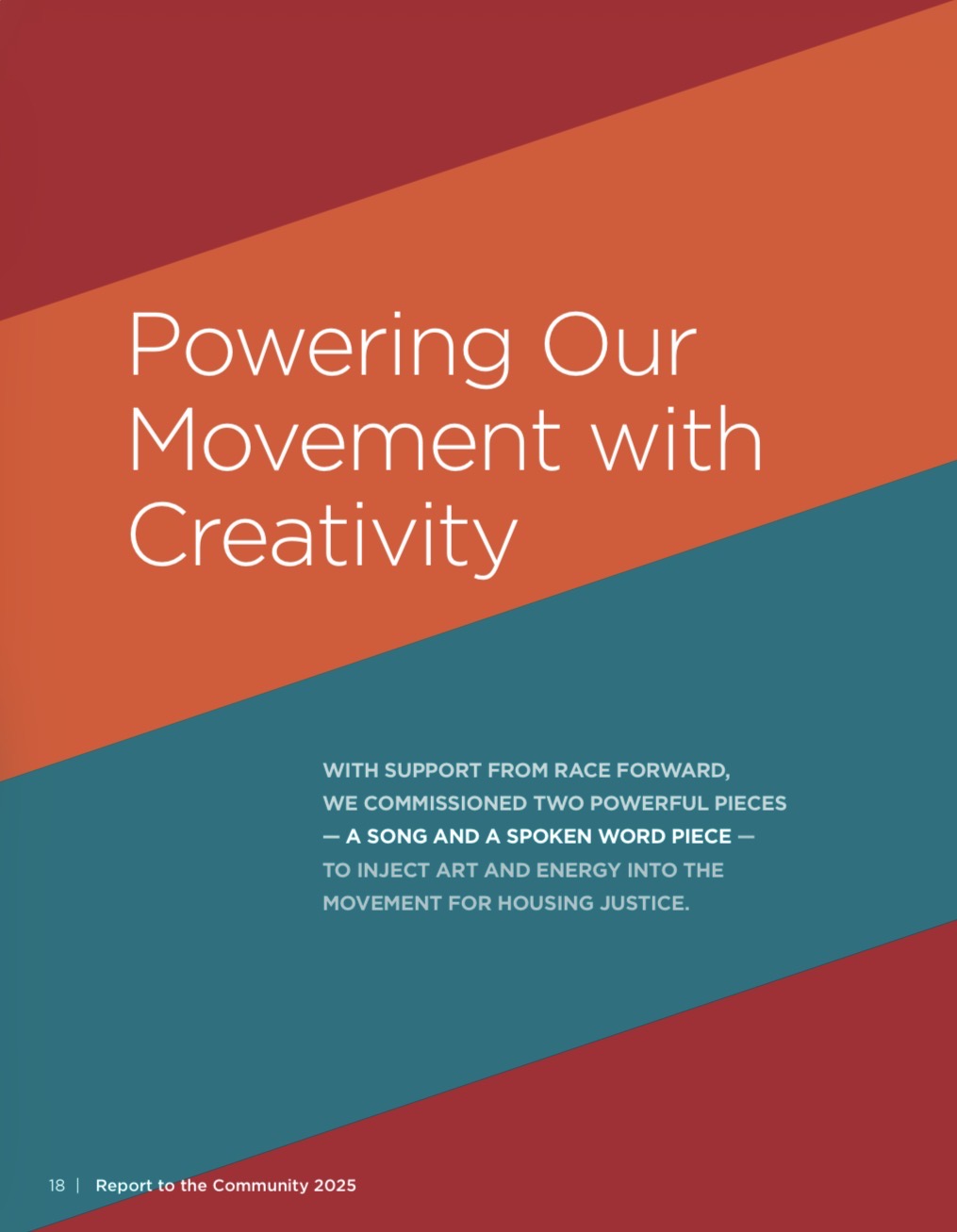
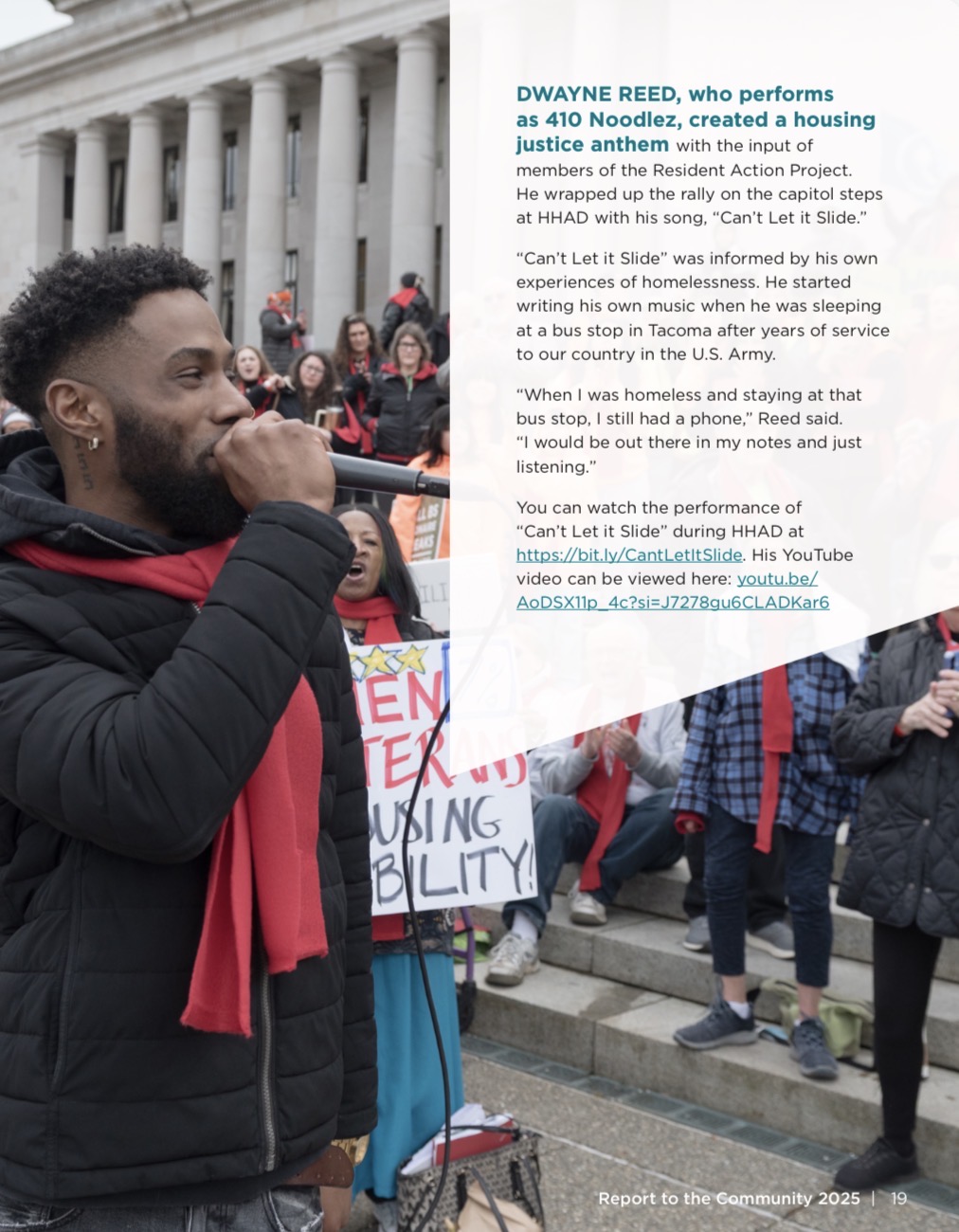
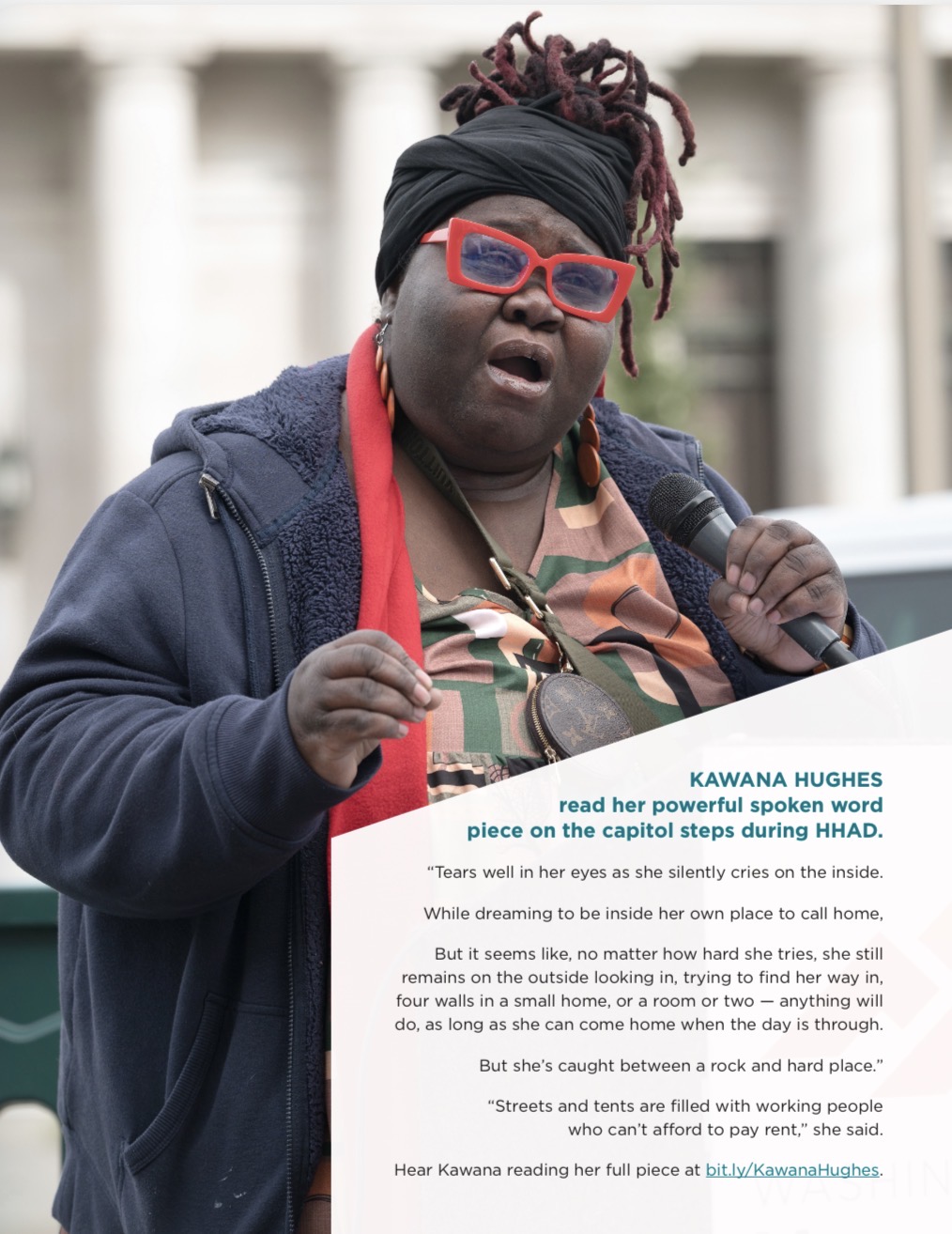

WASHINGTON LOW INCOME HOUSING ALLIANCE BOARD
- Paula Carvalho, President (Raikes Foundation), Seattle
- Adria Buchanan, Vice President (Fair Housing Center of Washington), Tacoma
- Poppi Handy, Secretary (third place design co-op), Seattle
- Karolynn Tom, Treasurer (Heritage University), Yakima
- Mindy Woods, Resource Development Committee Chair (Resident Action Project), Edmonds
- Pam Duncan, Equity and Racial Justice Committee Chair (Community Volunteer), Tacoma
- Lisa Byers, Strategic Planning Committee Chair (OPAL Community Land Trust), Orcas Island
- Isabel C. Garcia (Office of Rural and Farmworker Housing), Yakima
- Jennifer Bereskin (Resident Action Project), Bothell
- Rep. Julio Cortes (City of Everett), Everett
- Kresha Green (YWCA Seattle | King | Snohomish), Marysville
- Leona Kaleikini-Torrez (Community Action Center), Pullman
- Liz Trautman (Stand for Children Washington), Seattle
- Mercedes White Calf (SWACH), Southwest Washington
- Nancy Nash-Mendez (Housing Authority of Okanogan County), Omak
- Peter Shapiro (Community Volunteer), Seattle
- Sol Villarreal (Windermere Real Estate), Seattle
- Titi White (Mary’s Place), Seattle
WASHINGTON HOUSING ALLIANCE ACTION FUND BOARD
- Sheila Babb Anderson, President, Seattle
- Loren Tierney, Vice President, Seattle
- Kasey Burton, Secretary-Treasurer, Seattle
- Sharonne Navas, Endorsement Committee Co-Chair, Kent
- Gary Akizuki, Endorsement Committee Co-Chair, Vancouver
- Irene Basloe Saraf, Seattle
- Jennifer Bereskin, Bothell
- Paula Sardinas, Issaquah
- Peter Shapiro, Seattle
- Sesany Fennie-Jones, Vancouver
- Terri Anderson, Spokane
STAFF
- Adriana Parades (MSW intern Sep. 24-June 25)
- Ashe Tippins, Policy Specialist
- Duaa-Rahemaah Hunter, Statewide Organizer
- Itzchel Bazan, Development and Events Manager
- Kathy Lynn, Finance and Operations Manager
- Ma.Caroline Lopez, Director of Equity, Racial Justice, and Culture
- Michele Thomas, Director of Policy and Advocacy
- Po Leapai, Advocacy Organizer
- Rachael Myers, Executive Director
- Rob Huff, Communications Specialist
- Teresa Clark, Deputy Director
We’re deeply grateful to Mark Blatter, who stepped down from the board in 2024 after nine years of dedicated service, including many years as our thoughtful and committed Treasurer.
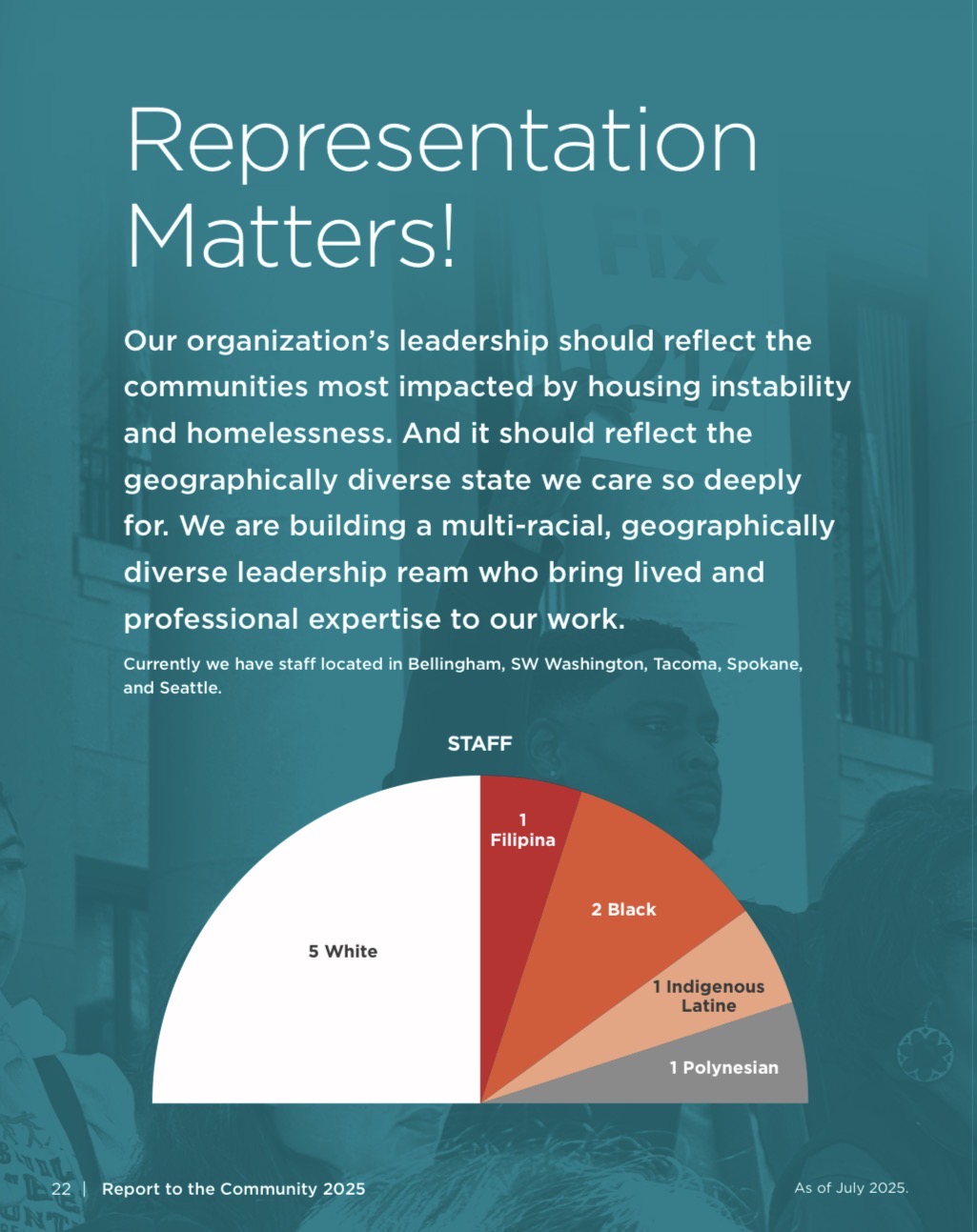
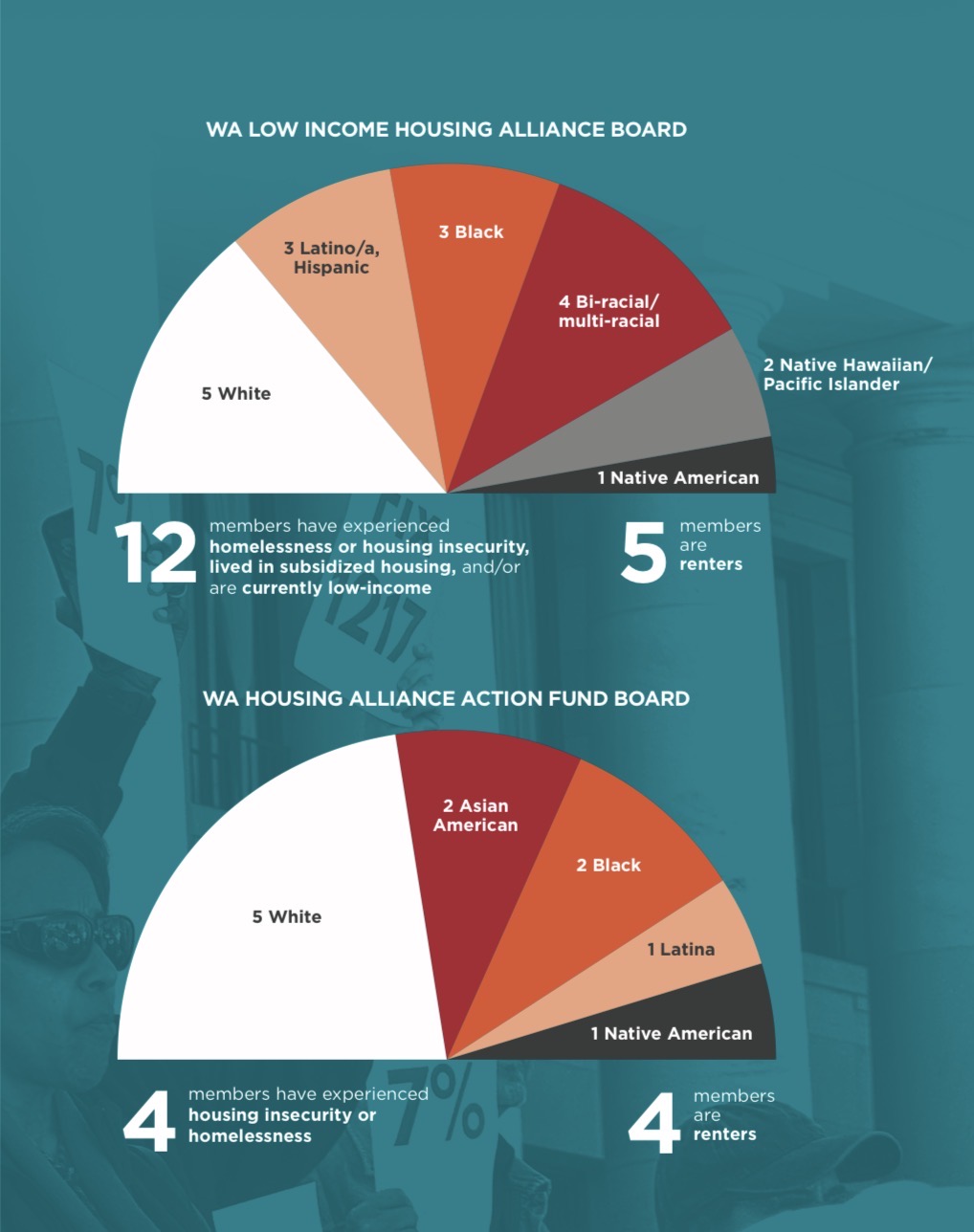
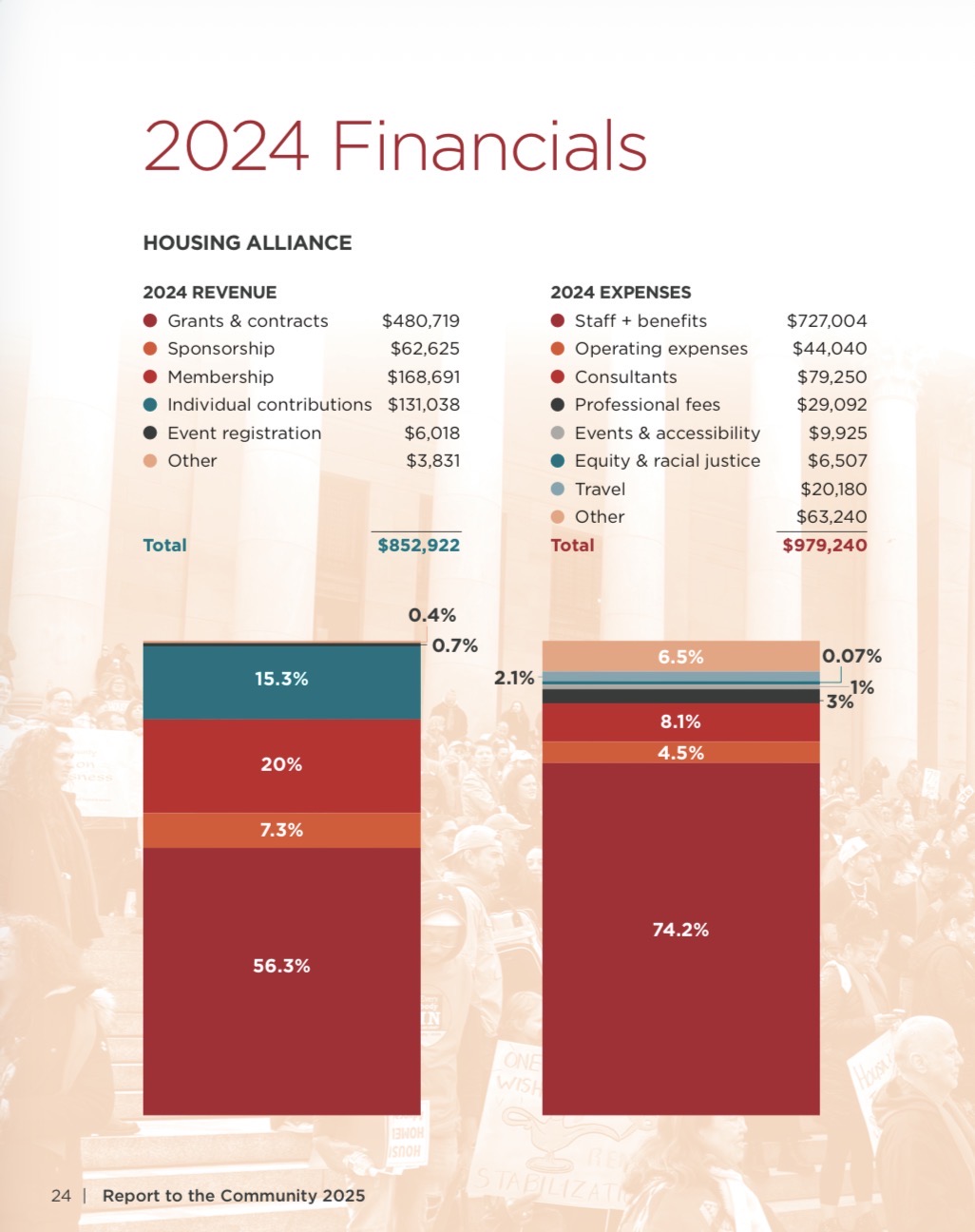
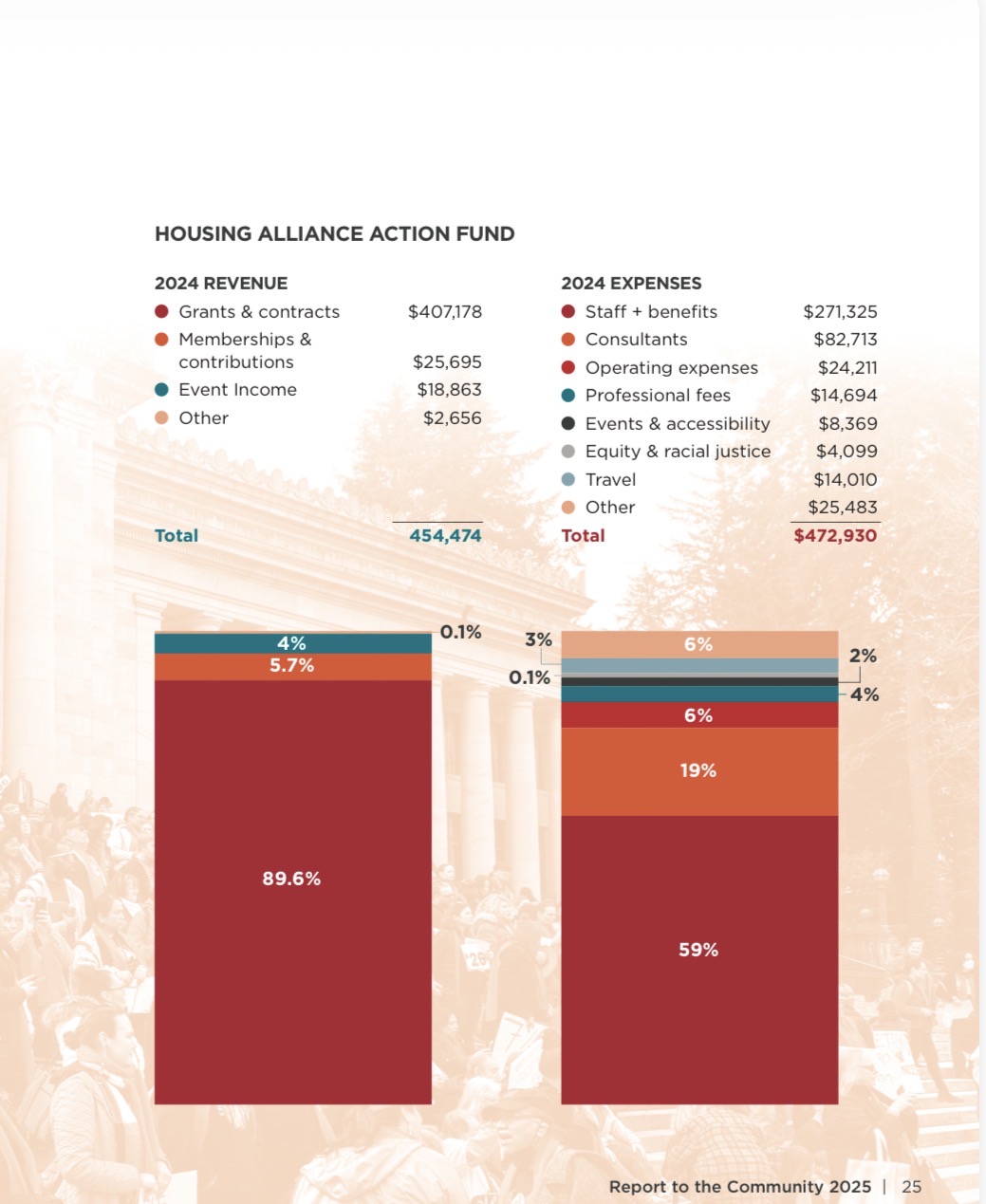
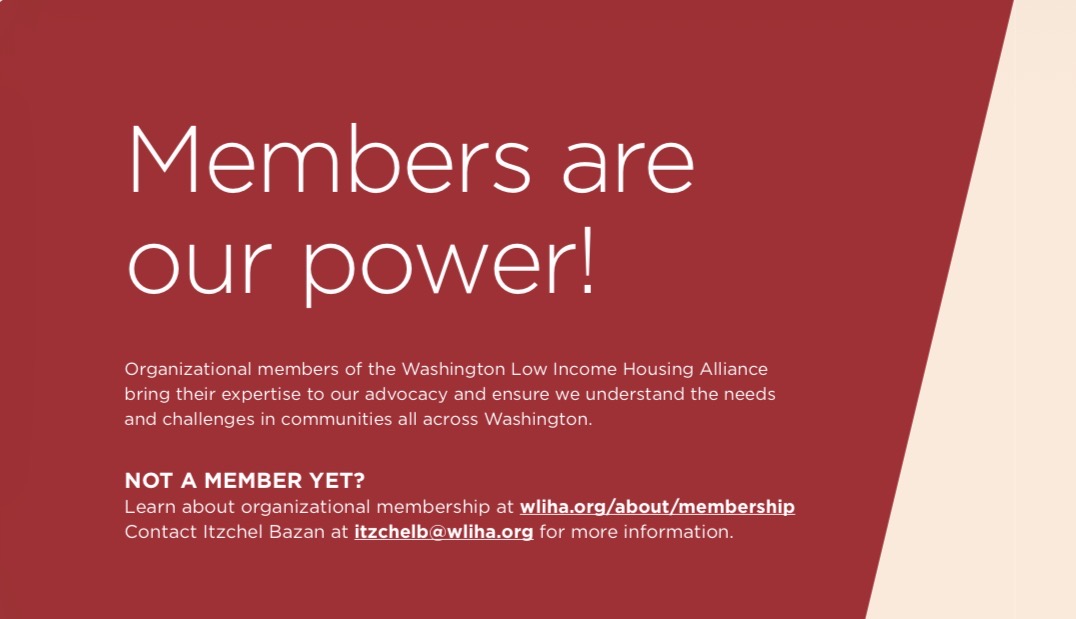
ORGANIZATIONAL MEMBERS
Alliance for a Just Society
All Saints Community Services
Associated Ministries of Tacoma Pierce
Association of Manufactured Homeowners
Bailey-Boushay House
Beacon Hill Development Group
Bellwether Housing
Bremerton Housing Authority
BRIDGE Housing Corporation
Building Changes
Carl Maxey Center
Cascades AIDS Project
Catholic Charities Housing Services
Catholic Charities of Eastern Washington
Catholic Charities: Central Washington
Catholic Charities: Western Washington
Chelan Douglas Community Action Council
Chelan Valley Hope
Chief Seattle Club
City of Olympia
City of Seattle Office of Housing
CJK Community Homes
Coalition Ending Gender-Based Violence
Cocoon House
Community Action Council of Lewis, Mason, & Thurston Counties
Community Action of Skagit County
Community Health Plan of Washington
Community Youth Services
Compass Housing Alliance
Corporation for Supportive Housing
Council for the Homeless
Dept of Commerce
DESC
Domestic Violence Services of Snohomish County
Elizabeth Gregory Home
Enterprise Community Partners
Environmental WORKS
Evergreen Treatment
Faith Action Partners for Housing
Family Support Center of South Sound
Firelands Workers United/Trabajadores Unidos
Frontier Behavioral Health
Goodwill Industries of the Inland NW
Greater Spokane Progress
Habitat for Humanity Seattle King County
Homes and Hope Community Land Trust
Homes First
Homestead Community Land Trust
Hopelink
Housing Authority of Grant County
Housing Authority of Grays Harbor
Housing Authority of the City of Bellingham
Housing Authority of the City of Pasco & Franklin County
Housing Authority of Vancouver
Housing Authority of Whatcom County
Housing Development Consortium Seattle King County
Housing Initiative LLC
Housing Resources Bainbridge
Impact Capital Inland Empire Residential Resources
Interim CDA
King County Dept. of Community and Human Services
King County Housing Authority
King County Regional Homelessness Authority
Kitsap Community Resources
Kitsap Mental Health Services
Kulshan Community Land Trust
Lake Washington United Methodist Church
League of Women Voters
Local Initiatives Support Corporation of Puget Sound
Lopez Community Land Trust
Low Income Housing Institute
Mary’s Place
Mental Health Housing Foundation
Mercy Housing
Mockingbird Society
Multi-Service Center
Muslim Housing Services
Neighborhood House
NeighborWorks of Grays Harbor County
Next Step Housing
Northwest Cooperative Development Center
Northwest Hospitality
Odyssey World International Education Services SW WA
Office of Rural & Farmworker Housing
Okanogan Behavioral Healthcare
Okanogan County Community Action Council
OPAL Community Land Trust
OPEIU Local 8
Opportunity Council
Parkview Services
Peninsula Poverty Response
Pioneer Human Services
Plymouth Housing Group
PorchLight
Puget Sound Advocates for Retirement Action
REACH Community Development
Reclaim
Renton Housing Authority
Rural Community Assistance Corporation
San Juan Community Home Trust
Seattle Housing Authority
Seattle King County Coalition on Homelessness
Share Vancouver
Salazar Architect
Sophia Way
Southwest Washington Equity Coalition
St. Stephen Housing Association
Tacoma Urban League
The Arc of King County
United Way King County
Urban League of Metropolitan Seattle
Vision House
Volunteers of America Western Washington
Washington Community Reinvestment Association
Washington Homeownership Resource Center
Washington Kids in Transition
Washington State Coalition Against Domestic Violence
Washington State Community Action Partnership
Washington State Housing Finance Commission
West Seattle Food Bank
Women’s Resource Center
Yakima Neighborhood Health Services
YWCA Seattle | King | Snohomish
COUNTY HOMELESSNESS NETWORK MEMBERS
Benton County
Serenity House of Clallam County
Clark County
Family Crisis Network
Franklin County
Island County
King County
Kitsap County
Lewis County
Okanogan Community Action Council
Olympic Community Action Project
Pacific County
Pierce County
Olympic Community Action Programs
Opportunity Council
Rural Resources Community Action
Skagit County
Snohomish County
Thurston County
Wahkiakum County
Walla Walla County
Washington Gorge Action Programs
Whatcom County
Whitman Community Action Center
Thank you for being part of the Housing Alliance!
Whether you are a member, donor, advocate, or all of the above, you are part of a powerful movement!
